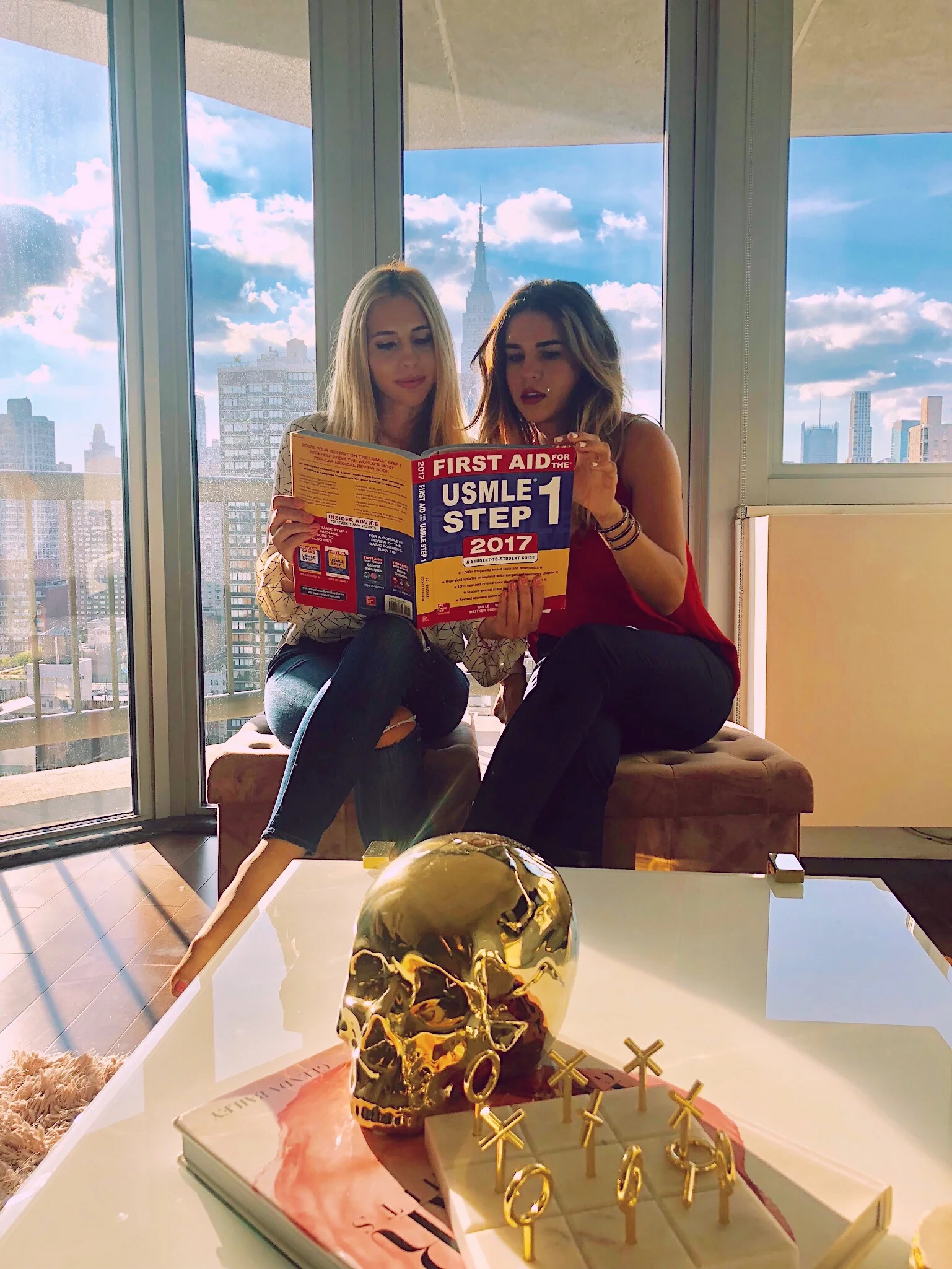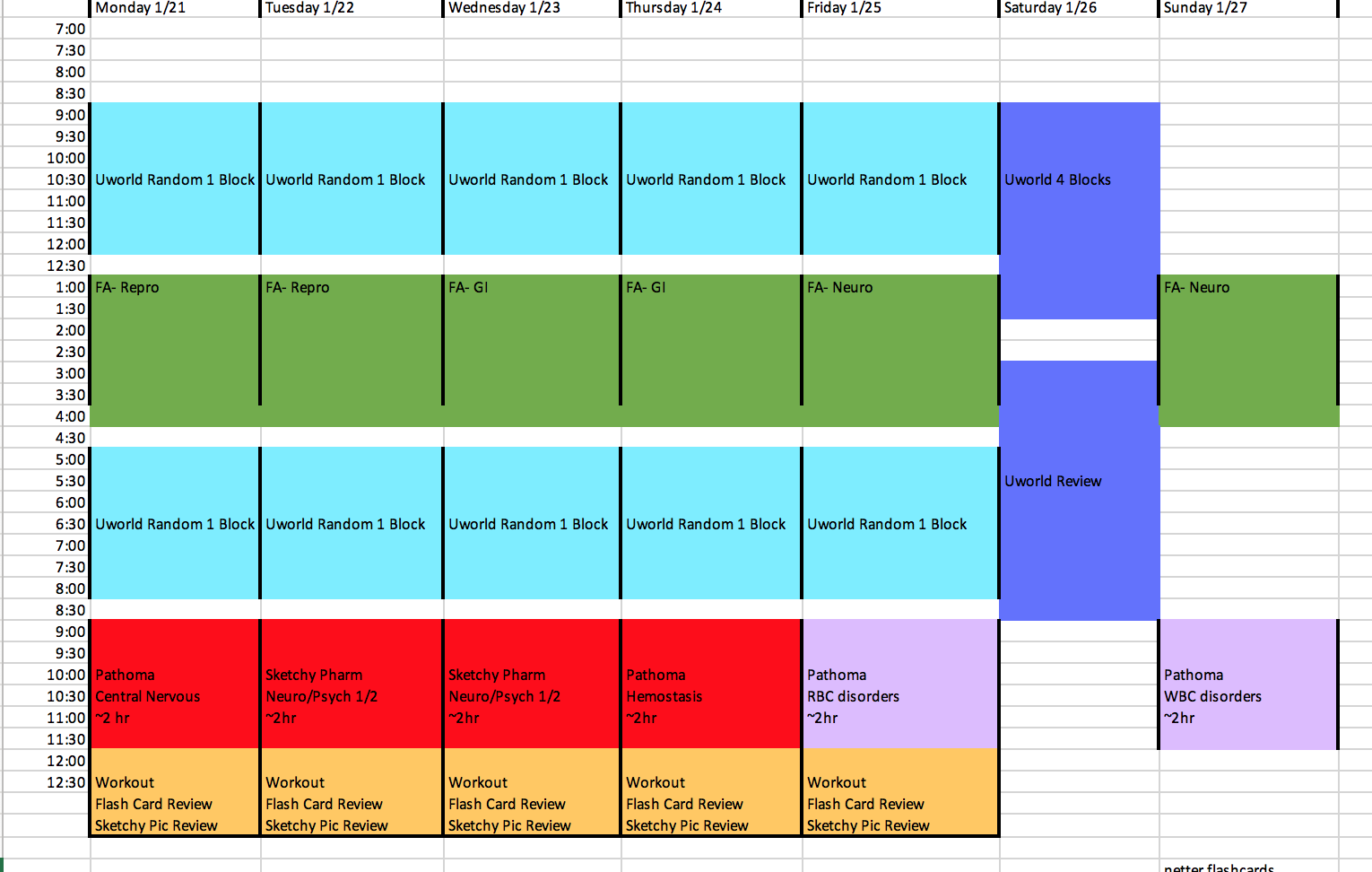STEP 1
The USMLE STEP 1 exam is the first medical licensing exam you need to take in medical school. Most medical school students take STEP 1 at the end of their second year. However, recently more and more medical students are taking the STEP 1 exam at the end of their third year- once students have had more clinical experiences. As MD/PhD students we take STEP 1 at the end of our pre-clinical training, before we rotate through various specialties in the hospital and before we start our PhD. We have an allocated six weeks to study for the exam.
Once you start preparing for STEP 1 studying, you’ll quickly realize that there are a lot of resources, so the process can be quite overwhelming. What we highly suggest is to start planning your study schedule and familiarizing yourself with the different resources before your six weeks of allocated study time. Below we wanted to share with you what worked and did not work for us. We also want to share with you what resources we found helpful and how we organized all of that into a study schedule. Please remember that everyone studies differently so what might have worked for us might or might not work for you specifically. However, we hope this blog post will provide you with three different perspectives on how to study for STEP 1.
Marisol’s Tips
Before STEP 1 Studying
I began studying three months prior to my six weeks of allocated study time. I would do eight hours of Boards and Beyond a week. Boards and Beyond are lectures that pair up nicely with the First Aid Step 1 book. I would watch the lectures and take notes in the First Aid book. Hence, everything I needed to study for STEP 1 was stored in my First Aid book. I started to review subjects that were covered the first year of medical school and those that I found were my weakest. I enjoyed doing Boards and Beyond early because it allowed me to review old concepts in a more relaxed environment. It can be very frustrating trying to learn everything last minute. So if you have the time, I suggest starting to review old concepts early on.
STEP 1 studying weeks 1-4
The first 4 weeks of my allocated study time were focused on reviewing my First Aid notes by going through the chapters all over again, doing UWORLD practice questions for those sections, and watching Sketchy videos. My daily schedule consisted of:
8am- 12PM Reviewing First Aid chapters
1-4PM Watching Sketchy Pharmacology for the specific First Aid chapters I was reviewing
4- 6PM Gym and Sketchy Anki Flashcards by @nicolet.life
6-10 PM 50 UWorld questions and review
STEP 1 studying weeks 5-6
The last two weeks of STEP 1 studying were focused mostly on doing UWorld questions and memorizing concepts via flashcards. I was doing approximately 120 questions a day and spending 2-3 hours doing the high yield flashcards from the brosencephalon Anki deck and flashcards I made myself from UWorld questions. I also took four practice exams- two from UWorld, one from USMLE Rx and one from NBME.
Do’s and Dont’s
Start using Sketchy Medicine when you start medical school. Sketchy Medicine is UNREAL. When it comes to memorizing microbiology and pharmacology, it makes it so easy. I would usually watch a Sketchy video once and do the flash cards from @nicolet.life (mentioned above) and those facts were ingrained into my brain. It really helps you memorize efficiently. I only watched Sketchy Physiology for disorders that required a lot of memorization (for example, the vasculitides, nephropathies, and congenital heart diseases). If I could go back, I would have not watched the Sketchy antibiotic videos. I felt that most of the information for antibiotics was covered in Sketchy Microbiology and doing the Sketchy antibiotic videos just felt repetitive. Additionally, I wish I dedicated more time to UWorld questions. A lot of STEP 1 is getting used to the style of the questions and training your brain to pick up clues in the question stem quickly. I finished all the UWorld questions, but I wish I would have had time to redo questions- especially the first questions I did when I was not preforming as well.
Lindsey’s Tips
Make a schedule and start with topics you feel you need the most review on. When you start studying you have the most energy. In the beginning, I had the most stamina to focus intently and really learn things I had forgotten in med school or just needed more review on. Once I started getting tired it was nice to have topics left at the end that I felt just need a quick review and did not require as much of my energy. Also, the schedule is just meant to be a guide to keep you moving along. I often fell behind on my schedule or modified it based on what I thought I needed more time on but used weekends to catch up or move things around.
Start watching sketchy early in your studying and quiz yourself often not only for micro but also for pharm. The earlier you start the more these will become ingrained in your mind and the more you will see them come up in UWORLD and then you can then reference the video. I think micro and pharm are more difficult to cram in.
NBMEs
They can be demoralizing but I would use them more as a tool and not worry about your score on them. Make sure to go over your wrong answers and spend some time learning from them.
UWORLD
I tried to make flashcards going over my wrong answers but found this hard to keep up with and overwhelming. I would say just to make flashcards for the ones you found very difficult or for an important point that keeps coming up. I ended up doing more of the latter and found that most efficient and practical.
Make sure to take breaks where you go outside and see friends, family, or do something you enjoy every week or two. This is marathon not a sprint. Having time where you can get away from thinking about the test helps you to refocus and energize so that you can come back to studying and be even more efficient.
Juliana’s Tips
Find what location you focus best in! During my first week, I tried different locations to see what I liked best and I personally liked to study at the library because it helped me focus and I liked being around other people that were also studying for the test. I would study from home when I was feeling tired or wanted a light study day.
Limit distractions while you are studying. I deleted distracting apps from my phone and then would re-download them occasionally when I needed a break. This was helpful for me and allowed me to stay focused while studying. There are also great websites like SelfControl that allow you to restrict access to certain websites that might distract you while studying.
Find a study partner! Lindsey and I created a schedule together and did it together. I found it helpful to have someone else on the same schedule to talk to, motivate each other, and go over practice tests with. Check out our sample schedule below!


